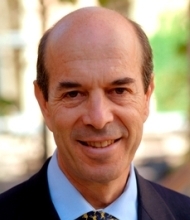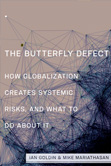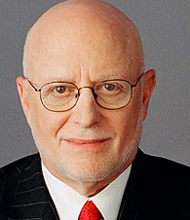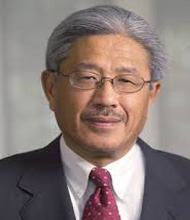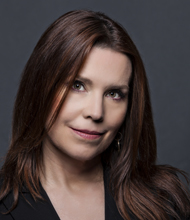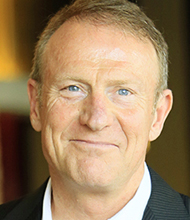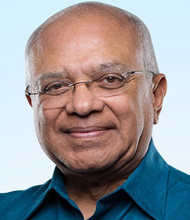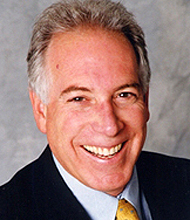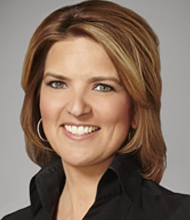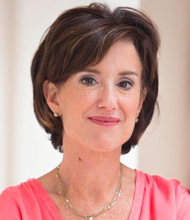| TRAVELS FROM |
|
SPEAKING FEE RANGE ** Please note that while this speaker’s specific speaking fee falls within the range posted above (for Continental U.S. based events), fees are subject to change. For current fee information or international event fees (which are generally 50-75% more than U.S based event fees), please contact us. $25,000 to $30,000 |
|
BOOK IAN GOLDIN speakers@coreagency.com |
| TRAVELS FROM |
|
SPEAKING FEE RANGE* $25,000 to $30,000 |
|
Book Ian Goldin speakers@coreagency.com |
- Professor of Globalization and Development and director of the Oxford Martin School at the University of Oxford.
- One of the world’s leading authorities on globalization and economic development.
- Past vice president of the World Bank and veteran of the Development Bank of Southern Africa, the European Bank for Reconstruction and Development and the OECD.
- Author of 20 influential books, including The Bufferfly Defect: How Globalization Creates Systemic Risks and What to Do About It.
- Recognized as a Global Leader of Tomorrow by the World Economic Forum.
Ian Goldin is a leading authority on globalization and economic development. Professor of Globalization and Development and director of the Oxford Martin School at the University of Oxford, Goldin’s insight and acumen have made him a trusted leader in some of the world’s most important non-governmental organizations.
Goldin served as vice president of the World Bank from 2003 to 2006. Before that, played a central role in driving the Bank’s research and policy agenda as Director of Development Policy. Between 1996 and 2001 Goldin, a South Africa native, served as chief executive and managing director of the Development Bank of Southern Africa and advised President Nelson Mandela. Earlier in his career Goldin was principal economist at the European Bank for Reconstruction and Development in London and a program director at the OECD Development Center in Paris, where he oversaw initiatives focused on trade, environment, and sustainable development.
Goldin has authored over 50 articles and 20 influential books, including Exceptional People: How Migration Shaped our World and Will Define Our Future (2011), Divided Nations: Why Global Governance is Failing and What We Can Do About It (2013), and The Butterfly Defect: How Globalization Creates Systemic Risks and What to Do About It (2014). His current book projects include The Pursuit of Development: Economic Growth, Social Change and Ideas and Age of Discovery: Navigating the Risks and Rewards of Our New Renaissance.
Goldin has been widely recognized for his many contributions to globalization and development research, including a knighthood from the French government and nomination as a Global Leader of Tomorrow by the World Economic Forum.
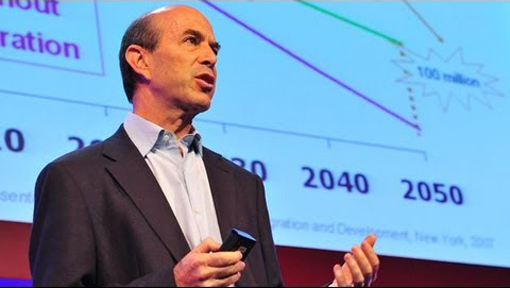 For me to get the maximum satisfaction from a presentation it must add value and ensure that the participants feel that it is something that is not only interesting but of use. For me to get the maximum satisfaction from a presentation it must add value and ensure that the participants feel that it is something that is not only interesting but of use. | |
| |
 | What do you want people to learn, to take away from your presentations? |
 | I get very encouraged by the feedback I receive from audiences about how the presentation has helped them to deal with key challenges in a very wide range of areas. My talks tend to surprise audiences by telling them things they didn't know about the world, about industries, about trends. I think people find that stimulating, so I do try and bring it back to the audience and say, ‘Okay, so these are the global trends happening in particular areas, and particular countries. What does it mean to you in your jobs?’
I work with a wide range of industries and sectors, and at different levels within organizations. Typically, I engage with top leadership teams and Boards, but also works with experts and other staff. In addition to focusing on strategic questions, I also at times examine what the trends mean for careers and the choices individuals and teams are making. For me to get the maximum satisfaction from a presentation it must add value and ensure that the participants feel that it is something that is not only interesting but of use. The people attending the event must find it effective in their own personal lives as well. |
 | How do you prepare for speaking engagements? |
 | I really try and understand the client's needs. The typical process would start with an extended conference call with the organizers of the event to understand why they're hosting it, who's going to be there and what they want to get out of it. I explain the range of things I can do to ensure that what I finally select to speak on meets the particular needs of the event organizers. I also ask them to send me any materials that could be of use. I sometimes meet with clients in person here in London, or in Oxford. I travel extensively for events so in many cases the preparatory discussions are telephonic or via skype.
After I've got everything I need I decide what I'm going to say and how I'm going to say it. I’ll often have a final telephone briefing just before an event so I can run through what I am going to say with the clients. They can then add the latest information about the event and the participants, and discussing the details, such as who is going to chair the session. Only then would I finalize my presentation. On the day of or the night before I do a dry run at the venue, often with the organizers present. It’s an opportunity to fine-tune the presentation, if needed. |
 | What types of audiences would most benefit from your message? |
 | I have spoken at many different places to audiences of varying sizes. For example, I've worked with small groups, such as boards of directors and executive committees, to define strategies to take their organizations forward. I also speak to huge groups, an example being this coming July when I'm going to speak at an event with 3,500 participants. So it varies. I've given TED talks and spoken to Microsoft's CEO Forum, the Clinton Global Initiative and for many years have been speaking at the Davos meetings of the World Economic Forum.
Sometimes I speak to a big audience and then have breakout sessions. I'm doing an event in a few weeks’ time, in the US, that includes three different types of interventions; a plenary, a breakout, and then a mentoring session where people will have the opportunity to book an appointment with me one-on-one. My aim is to be as flexible as possible to maximize the value of my engagement for the client. |
 | What types of people are in these groups? Are they CEOs? Or are they front-line employees, the associates? |
 | It varies, this week I am going to Paris to address a group of government ministers, and those are very senior people. I did an event last week with presidents and prime ministers. I often speak to boards of directors, CEOs and chairmen. But I also speak to middle managers, and give motivational talks to whole organizations. And then I do non-business events like trade associations and non-governmental organizations |
| For the past 9 years I have been an academic at the University of Oxford, which gives me the freedom for the first time to speak on my own behalf. | |
| |
 | What inspired you to start doing speaking engagements? How did you get started doing this? |
 | I've been in leadership roles for over 30 years. I'm very used to speaking. After I finished my doctorate I lectured at Harvard and Oxford and at other universities around the world. I'm used to public speaking, often in different contexts. For example, when I was working with President Mandela the two of us spoke to business or other audiences together. I did similar things when I worked at the World Bank and elsewhere.
After a career in which I have also been part of private and public sectors, for the past 9 years I have been an academic at the University of Oxford, which gives me the freedom for the first time to speak on my own behalf, not having to represent an organization. In all my previous roles I spoke for, or on behalf of, my employer or the government or World Bank. But I discovered as dean of this incredible faculty at Oxford that I could speak, drawing on the work of academics but also my own experience, and that the university was very comfortable with me doing these sorts of activities. As a result of my experience and unique insights I am gaining, my speaking career has developed over the time I have been at the University of Oxford. |
Ian Goldin offers unparalleled insight into the current state of economic development and globalization. Even more importantly, he has the research credentials and experience to make valuable predictions about the future of our ever-changing world. From his position on the frontiers of globalization research Goldin offers well-reasoned observations on the world we’ll see emerging between now and 2050.
Future predictions, of course, matter little without understanding how we reached today. Goldin combines his talent for long-range thinking with a deep understanding of the lessons past crises have taught us. Goldin corrects misunderstandings of trends such as migration, explaining how vital earlier migrations have been to our current state of development and offering tools for enlightened problem solving in the future. Knitting together past experiences and coming trends, Goldin shows his audiences that we can make the next hundred years a time of tremendous progress – if we avoid past pitfalls and creatively engage future challenges.
Regardless of topic, Goldin offers clear-eyed analysis of major global trends with a compelling and clear presentation style. Audiences leave inspired to choose wisely and think critically about the challenges that face us all, both now and into the future.
The World In 2020
Ian Goldin has a unique insight into the future. Drawing on the frontiers of research at Oxford and elsewhere, he provides illuminating perspectives on the major changes in society and technology which are likely to take place over coming decades. His presentations focus on the big picture, looking at the implications for businesses, governments and individual choice.
Professor Goldin explains the connection between social and technical change, and draws out the lessons of the past thirty years of unprecedented globalisation. He discusses whether the tidal wave of globalisation will continue and whether past trends are sustainable.
He examines first population and demographic trends, considering the implications for pensions, retirement, dependency and migration patterns to the Year 2050. Next, he considers economic trends, considering whether the current dramatic instability in the market is likely to be a short-term deviation from longer term trends. He considers the rise of Asia and emerging markets, providing perspectives on economic growth and opportunities over the coming 10+ years. The connections between social, technical and economic change and market growth and consumer behaviour are unpacked. Professor Goldin provides fresh insights into the future of computing, biotechnology, nano-technology, genetics and the likely implications of frontier technologies.
Ian Goldin is a leading global thinker on the future. He has extraordinary wide ranging knowledge and an ability to combine the latest in research with insights from the inside of global politics and business.
Globalization and Systemic Risk: Lessons from the Financial Crisis
Goldin is a world leading expert on the new forms of systemic risk which he identifies as arising from turbo charged globalisation associated with sharply increased levels of connectivity and technical change. He shows how the opportunities created by closer integration simultaneously create risk and instability. Goldin considers the causes and lesson of the recent financial crisis. He provides fresh insights into the risks associated with the rapid integration of global risks and provides a framework for businesses and governments to meet this challenge.
Humanity at the Crossroads
Goldin shows how this could be our best century ever. Or our worst, in which we may even destroy our centuries of progress. Professor Goldin identifies the major opportunities and progress which may be expected in coming years. He then draws out the ethical and social implications raised by the major shifts and advances in society and technology. He considers the public policy issues associated with the threats posed, including by climate change, pandemics and terrorism and identifies the measures necessary to ensure that society ensures that this is a century of shared opportunity, not destruction.
Migration
Goldin shows how our societies are created by a rich tapestry of migrants from different backgrounds. He identifies the vital role that migrants play in economic, social and technical development. He considers the implications of migration for the sending societies, the countries which receive migrants and the also the costs and benefits for the migrants themselves. In highly original analysis which goes far beyond the rhetoric of current debates on migration, Goldin provides long term perspective and shows how they inform future trends in migration and their implications. Drawing on a comparative historical and global perspective he provides principles and pragmatic insights for countries and communities dealing with this seemingly intractable issue.
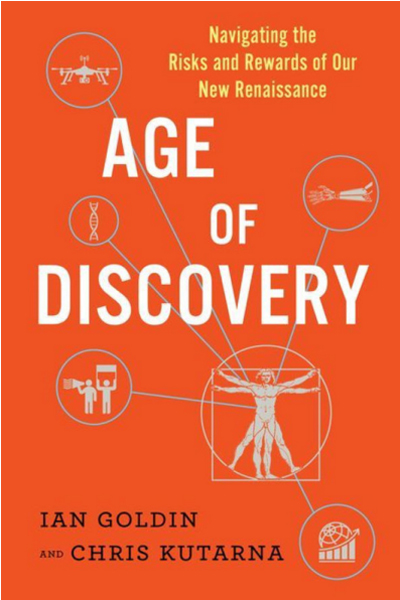
The Butterfly Defect: How Globalization Creates Systemic Risks, and What to Do about It
Global hyperconnectivity and increased system integration have led to vast benefits, including worldwide growth in incomes, education, innovation, and technology. But rapid globalization has also created concerns because the repercussions of local events now cascade over national borders and the fallout of financial meltdowns and environmental disasters affects everyone. The Butterfly Defect addresses the widening gap between systemic risks and their effective management. It shows how the new dynamics of turbo-charged globalization has the potential and power to destabilize our societies. Drawing on the latest insights from a wide variety of disciplines, Ian Goldin and Mike Mariathasan provide practical guidance for how governments, businesses, and individuals can better manage risk in our contemporary world.
Goldin and Mariathasan assert that the current complexities of globalization will not be sustainable as surprises become more frequent and have widespread impacts. The recent financial crisis exemplifies the new form of systemic risk that will characterize the coming decades, and the authors provide the first framework for understanding how such risk will function in the twenty-first century. Goldin and Mariathasan demonstrate that systemic risk issues are now endemic everywhere--in supply chains, pandemics, infrastructure, ecology and climate change, economics, and politics. Unless we are better able to address these concerns, they will lead to greater protectionism, xenophobia, nationalism, and, inevitably, deglobalization, rising conflict, and slower growth.
The Butterfly Defect shows that mitigating uncertainty and systemic risk in an interconnected world is an essential task for our future.
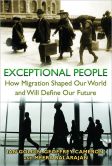 Exceptional People: How Migration Shaped Our World and Will Define Our Future
Exceptional People: How Migration Shaped Our World and Will Define Our FutureThroughout history, migrants have fueled the engine of human progress. Their movement has sparked innovation, spread ideas, relieved poverty, and laid the foundations for a global economy. In a world more interconnected than ever before, the number of people with the means and motivation to migrate will only increase. Exceptional People provides a long-term and global perspective on the implications and policy options for societies the world over. Challenging the received wisdom that a dramatic growth in migration is undesirable, the book proposes new approaches for governance that will embrace this international mobility.
Order Here
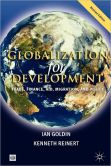 Globalization for Development: Trade, Finance, Aid, Migration, and Policy
Globalization for Development: Trade, Finance, Aid, Migration, and PolicyGlobalization and its relation to poverty reduction and development is not well understood. The book identifies the ways in which globalization can overcome poverty or make it worse. The book defines the big historical trends, identifies main global flows - trade, finance, aid, migration, and ideas - and examines how each can contribute to undermine economic development. By considering what helps and what does not, the book presents policy recommendations to make globalization more effective as a vehicle for shared growth and prosperity. It will be of interest to students, researchers and anyone interested in the effects of globalization in today′s economy and in international development issues.
Order Here

In this extensive interview, Ian Goldin discusses:

 VIDEO
VIDEO PROGRAMS
PROGRAMS SPEAKING
SPEAKING BOOKS
BOOKS INTERVIEW
INTERVIEW